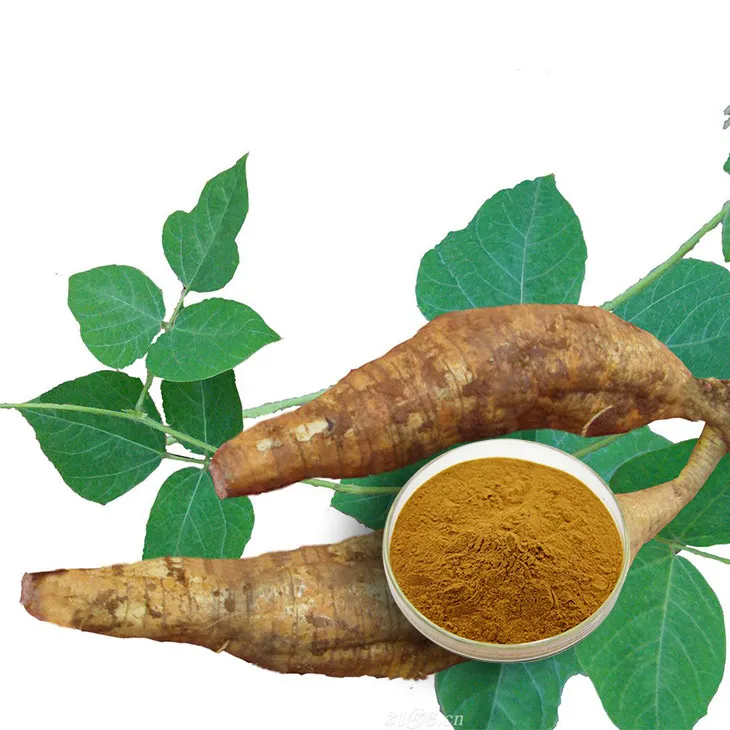- 0086-571-85302990
- sales@greenskybio.com
Pueraria lobata extract: Benefits, uses and possible side effects.
2024-11-13

I. Introduction
Pueraria lobata, also known as kudzu, is a plant that has been used in traditional Chinese medicine for centuries. The extract of Pueraria lobata has gained increasing attention in recent years due to its potential health - promoting properties. This article will explore the various benefits, uses, and possible side effects of Pueraria Lobata Extract.

II. Benefits of Pueraria Lobata Extract
A. Antioxidant properties
Pueraria Lobata Extract is rich in antioxidants such as flavonoids. Antioxidants play a crucial role in protecting the body from oxidative stress. Oxidative stress is associated with various chronic diseases, including heart disease, cancer, and neurodegenerative disorders. By neutralizing free radicals, the antioxidants in Pueraria lobata extract can help prevent cell damage and reduce the risk of these diseases.
B. Cardiovascular health
- Studies have shown that Pueraria lobata extract may have a positive impact on blood pressure. It may help lower blood pressure by relaxing blood vessels. This is beneficial for individuals with hypertension, as it can reduce the risk of heart attacks and strokes.
- It also has the potential to improve lipid profiles. Pueraria lobata extract may lower levels of bad cholesterol (LDL) and triglycerides, while increasing levels of good cholesterol (HDL). This helps in maintaining a healthy cardiovascular system.
C. Anti - inflammatory effects
Chronic inflammation is a root cause of many diseases. Pueraria lobata extract has been found to possess anti - inflammatory properties. It can inhibit the production of inflammatory cytokines, which are molecules that play a key role in the inflammatory response. This makes it potentially useful in the treatment of inflammatory conditions such as arthritis.
D. Diabetes management
- Some research suggests that Pueraria lobata extract may help regulate blood sugar levels. It may enhance insulin sensitivity, allowing cells to better respond to insulin. This is important for individuals with diabetes, as it can help them manage their blood sugar more effectively.
- It may also have a role in preventing diabetes - related complications, such as nerve damage and kidney disease, by reducing oxidative stress and inflammation associated with diabetes.
E. Liver protection
The liver is an important organ responsible for detoxification. Pueraria lobata extract can protect the liver from damage caused by toxins, such as alcohol and certain drugs. It may also help improve liver function by promoting the regeneration of liver cells.

III. Uses of Pueraria lobata extract
A. In traditional medicine
- In traditional Chinese medicine, Pueraria lobata has been used to treat a variety of ailments, including fever, headache, and diarrhea. The extract is often prepared as a decoction or tincture and administered orally.
- It has also been used for its muscle - relaxing properties. For example, it may be used to relieve muscle tension and spasms.
B. In modern medicine
- Due to its potential benefits for cardiovascular health, Pueraria lobata extract is being studied for its use in the prevention and treatment of heart disease. It may be used in combination with other medications or as a complementary therapy.
- Its anti - inflammatory and antioxidant properties make it a potential candidate for the development of new drugs for the treatment of inflammatory and neurodegenerative diseases.
- In the field of dermatology, Pueraria lobata extract may be used in skincare products. Its antioxidant and anti - inflammatory effects can help protect the skin from damage caused by environmental factors and reduce skin inflammation.
C. In the food and beverage industry
- Pueraria lobata extract can be used as a natural food additive. It can add flavor and nutritional value to food products. For example, it may be added to beverages such as tea or juice to enhance their antioxidant content.
- It is also used in the production of some functional foods. These are foods that are designed to provide additional health benefits beyond basic nutrition. Pueraria lobata - based functional foods may target specific health conditions, such as cardiovascular health or diabetes management.

IV. Possible side effects of Pueraria lobata extract
A. Gastrointestinal issues
Some people may experience gastrointestinal side effects after taking Pueraria lobata extract. These can include nausea, vomiting, diarrhea, or abdominal pain. These side effects are usually mild and may go away on their own. However, if they persist or are severe, medical attention should be sought.
B. Allergic reactions
Allergic reactions to Pueraria lobata extract are rare but possible. Symptoms of an allergic reaction may include rash, itching, swelling, or difficulty breathing. If an allergic reaction occurs, immediate medical treatment is required.
C. Hormonal effects
There is some concern that Pueraria lobata extract may have hormonal effects. It contains compounds that may interact with the endocrine system. In particular, it may affect estrogen levels in the body. This could potentially have implications for individuals with hormonal imbalances or certain medical conditions, such as breast cancer. However, more research is needed to fully understand these hormonal effects.
V. Precautions and considerations
- Before taking Pueraria lobata extract, it is important to consult a healthcare provider, especially if you have pre - existing medical conditions or are taking other medications. They can assess whether it is safe for you to use and provide appropriate dosage recommendations.
- Pregnant and breastfeeding women should avoid using Pueraria lobata extract, as there is not enough evidence to determine its safety during pregnancy and lactation.
- If you experience any side effects while taking Pueraria lobata extract, stop using it immediately and consult a doctor.
VI. Conclusion
Pueraria lobata extract offers a wide range of potential benefits, from antioxidant and anti - inflammatory properties to applications in various fields such as medicine and the food industry. However, it is important to be aware of its possible side effects and take appropriate precautions. Further research is needed to fully understand the mechanisms of action of Pueraria lobata extract and to optimize its use for health promotion and disease prevention.
FAQ:
What are the main benefits of Pueraria lobata extract?
Pueraria lobata extract has several benefits. It is rich in isoflavones which may have antioxidant properties. These antioxidants can help combat free radicals in the body, potentially reducing the risk of chronic diseases. It may also have estrogen - like effects which could be beneficial for menopausal women in alleviating symptoms such as hot flashes.
What are the common uses of Pueraria lobata extract?
The extract is commonly used in traditional medicine. It can be used for treating certain respiratory problems like coughs and colds. In the cosmetic industry, it is used in some skin care products due to its potential anti - aging properties. Additionally, it may be used in dietary supplements for its purported health - promoting effects.
What are the possible side effects of Pueraria lobata extract?
Some possible side effects include gastrointestinal issues such as nausea, vomiting, or diarrhea. In some cases, it may cause allergic reactions in sensitive individuals. Also, due to its estrogen - like effects, there may be concerns about hormonal imbalances, especially if consumed in large amounts over a long period.
Is Pueraria lobata extract safe for everyone?
No, it is not safe for everyone. Pregnant and breastfeeding women should avoid it as its effects on fetal development and infants are not fully known. People with hormone - related disorders such as breast cancer should also be cautious as its estrogen - like activity may interfere with their condition.
How is Pueraria lobata extract obtained?
Pueraria lobata extract is typically obtained through a process of extraction from the roots or other parts of the Pueraria lobata plant. This may involve using solvents like ethanol or water to isolate the active compounds.
Related literature
- The Chemical Constituents and Pharmacological Activities of Pueraria lobata: A Review"
- "Beneficial Effects of Pueraria lobata in Health and Disease"
- "Pueraria lobata Extract: A Potential Source of Bioactive Compounds"
- ▶ Hesperidin
- ▶ citrus bioflavonoids
- ▶ plant extract
- ▶ lycopene
- ▶ Diosmin
- ▶ Grape seed extract
- ▶ Sea buckthorn Juice Powder
- ▶ Beetroot powder
- ▶ Hops Extract
- ▶ Artichoke Extract
- ▶ Reishi mushroom extract
- ▶ Astaxanthin
- ▶ Green Tea Extract
- ▶ Curcumin Extract
- ▶ Horse Chestnut Extract
- ▶ Other Problems
- ▶ Boswellia Serrata Extract
- ▶ Resveratrol Extract
- ▶ Marigold Extract
- ▶ Grape Leaf Extract
- ▶ blog3
- ▶ blog4
- ▶ blog5
-
Organic Tongkat Ali extract powder factory.
2024-11-13
-
How to make powder with ashwagandha extract.
2024-11-13
-
Rosehip extract manufacturers from China.
2024-11-13
-
The best cat's claw extract in nature.
2024-11-13
-
Chinese Dandelion Leaf Extract Suppliers.
2024-11-13
-
Withania Somnifera Extract
2024-11-13
-
Eyebright Extract
2024-11-13
-
Curcuma Longa Extract/Turmeric extract
2024-11-13
-
Diosmin
2024-11-13
-
Chasteberry Extract
2024-11-13
-
Sea buckthorn Juice Powder
2024-11-13
-
Giant Knotweed Extract
2024-11-13
-
Natural grape seed extract
2024-11-13
-
Thunder God Vine Extract
2024-11-13
-
Jujube Extract
2024-11-13





















